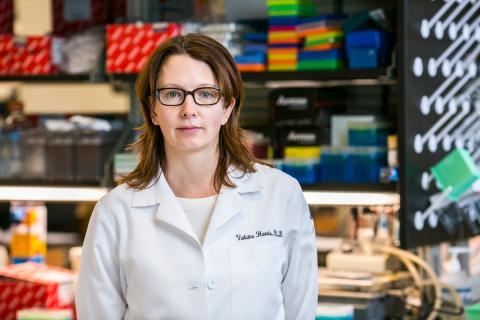
“As a scientist, having such a close connection with patients and their stories is highly motivating. It also allows us to think outside the box, and focus our research on topics that will really make a difference.”
- Dr. Violaine K. Harris, Senior Research Scientist
Dr. Harris joined the laboratory of the Tisch Multiple Sclerosis Research Center of New York in 2004, where she has been developing cell therapy strategies to promote repair and regeneration in multiple sclerosis. Her work has led to the groundbreaking stem cell clinical trial, the first ever to test bone marrow-derived neural progenitors in patients with MS. Through investigating adult stem cells from bone marrow- a source of cells from the same individual (autologous) - known as mesenchymal stem cell-derived neural progenitors (MSC-NPs), Dr. Harris, and her team have discovered that these cells promote repair in areas of demyelination when injected into mouse models of multiple sclerosis. Through the uniquely close partnership between the researchers, clinicians, and patients, this stem cell therapy was tested in twenty MS patients through an FDA approved Phase I clinical trial. Results from the study were remarkable and unprecedented. Patients with both primary and secondary progressive MS experienced improvement in bladder function, vision, and walking speed with no adverse effects. A recent study that followed the Phase I patients for 2 additional years after treatment suggested that some of the neurological improvements were sustained. A placebo-controlled, double-blind Phase II study is currently underway with expected completion in 2022. Dr. Harris oversees the Tisch MS Regenerative Medicine Laboratory and the manufacturing of clinical-grade doses of autologous MSC-NPs for cell therapy treatments in trial subjects with MS.
Dr. Harris and her team are actively investigating the mechanisms by which MSC-NPs promote repair and regeneration in MS. MSC-NPs promote repair through a bystander mechanism, where they release a number of molecules that impact damaged cells in the brain as well as activated immune cells. Biomarker analysis in MS patients receiving MSC-NP treatment showed that biomarkers associated with activated microglia are altered in response to the treatment. Microglia are resident immune cells in the brain and their chronic activation is associated with MS disease progression. Dr. Harris has developed cell culture models of microglia in order to better understand the microglial response in the presence of MSC-NPs. The identification of molecules involved in MSC-NP-mediated repair will have therapeutic potential in future cell therapy strategies.
As regenerative therapies are developed and tested in clinical trials, there is a need for biomarkers that can measure neural repair and remyelination in MS. Cerebrospinal fluid (CSF) circulates around the brain and spinal cord and, thus, is ideally suited to measure neural repair. Dr. Harris’ research team is investigating the CSF of patients treated with stem cells or other MS medications in order to discover novel disease biomarkers. In a review article, Dr. Harris and Dr. Sadiq discuss the benefit of using CSF biomarkers as a means to understanding the level of disease activity and treatment response in MS patients. Through her expertise in studying biomarkers, Dr. Harris and her team are revealing a better understanding of disease mechanisms that lead directly to personalized treatments for patients.
Dr. Harris has had a longstanding interest in stem cell biology and in understanding the mechanisms of cell signaling and differentiation. She received her PhD in Pharmacology from Georgetown University, and her BA in Biochemistry/Molecular, Cellular, and Developmental Biology from the University of Colorado in Boulder. Her training also included a postdoctoral fellowship at Mount Sinai Medical Center in New York, where she studied mechanisms involved in the maintenance of cancer stem cells.
Dr. Harris works with research assistant Alyssa Carlson (BA from Wesleyan University).
Selected Publications
Tisch MS Research Center of New York
521 West 57th Street
4th Floor
New York, NY 10019
(646) 557-3900
Support Tisch MS
Support Tisch MS and our innovative research leading to treatments that improve the lives of patients.
